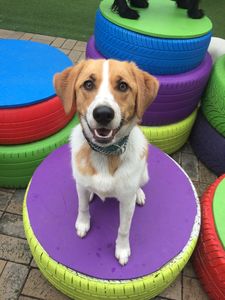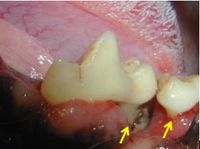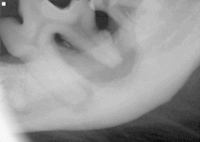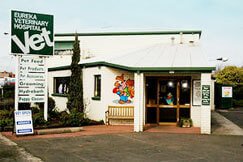After Hours
0408 512 323
Good dental hygiene is just as important in our pets as it is in us.
The advantages of treating your pets teeth correctly will allow them to:
- Live longer
- Be healthier
- Smell better
- Eat better
- Live in less pain
All dental procedures at the Eureka Veterinary Clinic are performed under a general anaesthesia. Most of us have been in the dentist's chair and know how scary the sound of the dental drill is and how painful it can be if the local anaesthesia is not given.
Performing dental procedures under general anaesthesia is the safest way of ensuring the procedure is done correctly and in a pain free manner. A complete oral examination in pets is impossible without general anaesthesia. If the dental disease has progressed to the need for surgical extractions, then this is equivalent to having an adult wisdom tooth removed in a person.


You may have heard of Non-Anaesthetic Dentistry (NAD). NAD is a process where the tartar is "cracked" off without any anaesthesia. Though this removes the cosmetic effect of tartar and calculus from the tooth, it is not solving the problem. The plaque and bacteria that need to be removed lie under the gum and it is this that if not removed, will lead to continuing periodontal disease and worsening of the disease. On top of that, the tooth surface remains roughened allowing bacteria and plaque to start reforming immediately. The only way an oral exam and treatment can be done right is under a general anaesthesia.
All anaesthetic procedures at the Eureka veterinary clinic receive intraoperative fluid therapy and in animals with other aliments or older animals, this fluid therapy will be extended. Your vet or nurse will discuss this with you at the admission process.
THE NIGHT BEFORE
You can allow your pet to have dinner the night before but it must be before 8pm. They are required to be fasted of food from 8pm the night before. Water is allowed.
Rabbits are different; they are not to be fasted and should have access to food and water at all times.
ADMISSION PROCEDURE
Please bring your pet to the clinic between 8.00am and 9.30am. If your pet has not had a previous health examination and vaccination, then a consultation prior to the procedure may be required. It is important for your pet and the health of those animals in hospital that your pet is up to date with their vaccination status prior to being hospitalised.
Please allow at least 15 minutes for your pet to be admitted to the hospital. This is to allow our staff to ensure we have the correct contact details and answer any questions you have prior to the procedure. Please ensure you are contactable throughout the day.
It can be difficult to give an accurate estimate for a dental procedure because we often cannot tell how good or bad things are until we examine the mouth under general anaesthesia. It is important that you are contactable through the day.
DISCHARGE INSTRUCTIONS:
Most pets undergoing a dental procedure will be up-and-about and ready to walk out the door in the afternoon on the same day. Most will be discharged after 4.30pm to allow ample time to recover from the anaesthesia. All patients will receive pain relief before and after the procedure.
Removing a tooth in our pets can be quite involved and requires oral surgery. A lot of the teeth in our pets mouth are multi-rooted teeth; in order to remove these without fracturing to roots and causing more damage, advance procedures are required to remove the teeth safely.
If gum surgery has been performed, avoid bones and hard food for 2 weeks. Avoid tooth brushing during this time.
In the case of major dental procedures, because prolonged pain relief and monitoring is required, they may be required to remain in hospital overnight to ensure they are kept comfortable.
THE FIRST NIGHT HOME:
Your pet needs to be kept indoors and warm. After an anaesthetic and dental procedure, animals can be slow at regulating their body temperature. They may appear groggy, but this should wear off over the next 24 hours.
They should be offered food and water, but do not be alarmed if your pet does not eat much that evening. They should resume a normal appetite within 48 hours.
WHAT NEXT:
- You must follow the instructions in the discharge notes.
- If given medications, ensure your pet gets these at the appropriate time as per the instructions on the label.
- Follow any dental home care advise you have received
- When to contact the clinic
- It is not uncommon to get blood in the mouth/saliva for 24 hours. If this persists after 48 hours then contact the clinic
- Any swelling to the mouth that extends beyond 24 hours.
- Coughing that persists for more than 24 hours.
- Reluctance to eat after 24 hours.
- Any post operative concerned you have.
CLICK HERE for available times and bookingsBOOK ONLINE >
Location



